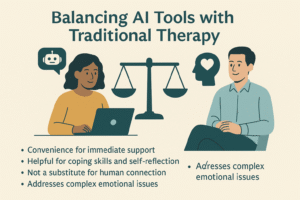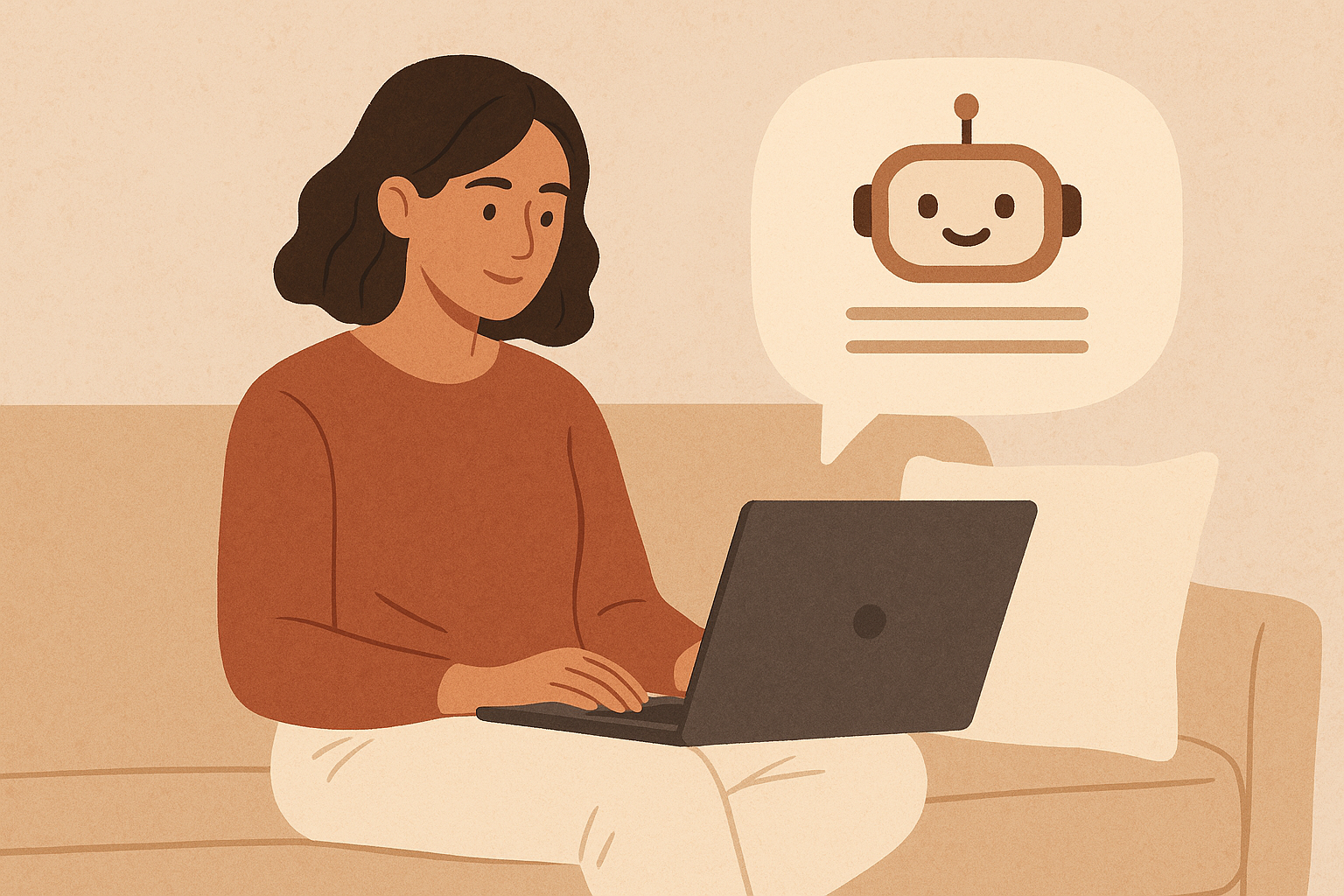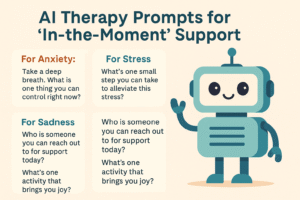A study published in PLOS Mental Health found that ChatGPT’s responses in couple therapy scenarios were rated higher than those of human therapists in areas like empathy and cultural sensitivity . Participants often couldn’t distinguish between AI-generated and human responses, indicating the potential of AI in therapeutic settings.
Another review highlighted that AI therapy chatbots could reduce depression symptoms by 64% compared to control groups . These findings suggest that AI can play a supportive role in mental health care, especially when immediate assistance is needed.
Who’s Turning to AI for Therapy?
Recent data shows that Millennials and Gen Z are the most active users of AI for mental health support. These generations are digital natives, comfortable with technology and often seeking instant, low-barrier tools to manage their emotional well-being. In fact, a 2024 survey by Mental Health America found that over 60% of young adults aged 18–34 have used AI chatbots like ChatGPT, Woebot, or Wysa to explore therapeutic conversations or coping prompts. Many report appreciating the 24/7 availability, nonjudgmental responses, and anonymity that AI platforms provide, especially when they’re not yet ready or able to speak with a human therapist.
“In-the-Moment” AI Prompts for Immediate Support
Here’s a clear and helpful table that maps emotional states to AI prompts someone can use to ask a chatbot (like ChatGPT) for in-the-moment support:
| Emotional State | Prompt to Ask an AI Chatbot (e.g., ChatGPT) |
| Anxiety | “I’m feeling anxious—can you help me focus on what I can control right now?” |
| “Help me ground myself. What are three things I can see, hear, and feel?” | |
| Stress | “I’m overwhelmed. What’s one small step I can take to feel better?” |
| “Can you help me reflect on a time I overcame something difficult?” | |
| Sadness | “I’m feeling really down. Can you help me think of someone I can reach out to?” |
| “What’s something small I could do right now that might lift my mood?” |
Fun and Therapeutic AI Interactions
Beyond traditional support, AI can also play a role in uplifting your mood with fun, creative, and engaging prompts. These lighthearted interactions can serve as mini wellness breaks throughout your day, helping you relax, refocus, or simply laugh. From storytelling and journaling to mood-boosting activities, AI can be a surprisingly delightful mental health companion.
| Activity | What to Ask ChatGPT or an AI Tool | Therapeutic Benefit |
| Gratitude Practice | “Can you help me write three things I’m grateful for today?” | Boosts positivity and shifts focus from stress |
| Journaling Prompts | “Give me a reflective prompt to journal about today.” | Encourages mindfulness and emotional clarity |
| Mood-Boosting Playlists | “Recommend a playlist to lift my mood.” | Uses music to elevate emotions and energy |
| Guided Imagery | “Can you walk me through a calming beach visualization?” | Aids in relaxation and mental escape |
| Creative Writing | “Let’s co-write a short, silly story about a dragon with anxiety.” | Encourages laughter and creative processing |
| Affirmations Generator | “Give me five affirmations for confidence and calm.” | Reinforces positive self-talk |
| Mini Meditation Coach | “Guide me through a 2-minute breathing or body scan exercise.” | Lowers stress and anchors attention |
When AI Isn’t the Right Tool
While AI therapy tools offer valuable support, they are not appropriate in crisis situations or when someone is experiencing acute mental health symptoms. If you or someone you know is having thoughts of self-harm, suicide, or is in danger, it’s critical to seek help from licensed professionals or emergency services. AI cannot replace the training, intuition, and accountability of a human mental health provider in these moments. For crisis support in the U.S., you can contact the 988 Suicide & Crisis Lifeline by calling or texting 988, or visit a local emergency room for immediate care.
The Importance of Human Connection in Therapy
While AI tools offer valuable support, they cannot replicate the depth of human interaction. A study by the American Psychiatric Association emphasized that human therapists excel in areas like agenda-setting and applying cognitive-behavioral techniques. Human therapists can adapt to individual needs, provide nuanced understanding, and build therapeutic relationships that AI currently cannot match.
Balancing AI Tools with Traditional Therapy
AI therapy tools can serve as a supplement to traditional therapy, offering immediate support between sessions or when access to a therapist is limited. However, for long-term mental health care, especially for complex issues, human therapists remain essential.
AI therapy tools provide accessible and immediate support for individuals seeking help with their mental health. They can offer valuable “in-the-moment” prompts and coping strategies. However, they should be viewed as complementary to, not a replacement for, traditional therapy. Human connection, empathy, and personalized care are irreplaceable components of effective mental health treatment.
Support at Your Fingertips with Alba Wellness
At Alba Wellness, we believe in combining the best of modern tools and human care. While AI therapy can be a helpful companion in tough moments, healing often requires deeper, personalized support.
Whether you’re navigating trauma, anxiety, or simply feeling overwhelmed, our compassionate therapists are here to help. We offer secure virtual therapy sessions, as well as limited in-person appointments in Universal City.
Ready to talk? Schedule an appointment or call us at (210) 566-1280.
Your journey to wellness doesn’t have to wait.
Note: For those interested in exploring AI therapy tools, it’s crucial to choose reputable platforms and consult with healthcare professionals to ensure they meet individual needs.


